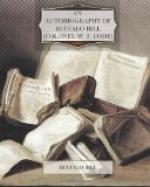There was much excitement at the Post. The guards had been doubled. Captain Parker had all the scouts at his headquarters. He was seeking to get one of them to take dispatches to General Sheridan at Fort Hays. I reported to him at once, telling him of my encounter and my escape.
“You were lucky to think of that cattle story, Cody,” he said. “But for that little game your scalp would now be ornamenting a Kiowa lodge.”
“Cody,” put in Dick Curtis, “the captain is trying to get somebody to take dispatches to General Sheridan. None of the scouts here seem willing to undertake the trip. They say they are not well enough acquainted with the country to find the way at night.”
A storm was coming up, and it was sure to be a dark night. Not only did the scouts fear they would lose the way, but, with hostile Indians all about, the undertaking was exceedingly dangerous. A large party of redskins was known to be encamped at Walnut Creek, on the direct road to Fort Hays.
Observing that Curtis was obviously trying to induce me to volunteer, I made an evasive answer. I was wearied from my long day’s ride, and the beating I received from the Indians had not rested me any. But Curtis was persistent. He said:
“I wish you were not so tired, Bill. You know the country better than the rest of us. I’m certain you could go through.”
“As far as the ride is concerned,” I said, “that would not matter. But this is risky business just now, with the country full of hostile Indians. Still, if no other man will volunteer I will chance it, provided I am supplied with a good horse. I am tired of dodging Indians on a Government mule.”
At this, Captain Nolan, who had been listening, said:
“Bill, you can have the best horse in my company.”
I picked the horse ridden by Captain Nolan’s first sergeant. To the captain’s inquiry as to whether I was sure I could find my way, I replied:
“I have hunted on every acre of ground between here and Fort Hays. I can almost keep my route by the bones of the dead buffaloes.”
“Never fear about Cody, captain,” Curtis added; “he is as good in the dark as he is in the daylight.”
By ten o’clock that night I was on my way to Fort Hays, sixty-five miles distant across the country.
It was pitch-dark, but this I liked, as it lessened the probability of the Indians’ seeing me unless I stumbled on them by accident. My greatest danger was that my horse might run into a hole and fall, and in this way get away from me. To avoid any such accident I tied one end of my rawhide lariat to my belt and the other to the bridle. I did not propose to be left alone, on foot, on that prairie.
Before I had traveled three miles the horse, sure enough, stepped into a prairie dog’s hole. Down he went, throwing me over his head. He sprang to his feet before I could catch the bridle, and galloped away into the darkness. But when he reached the end of his lariat he discovered that he was picketed to Bison William. I brought him up standing, recovered my gun, which had fallen to the ground, and was soon in the saddle again.




